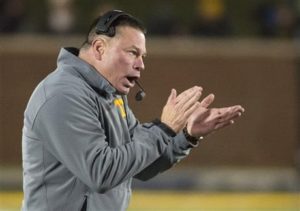
By STEVE MEGARGEE
In this Nov. 21, 2015, file photo, Tennessee head coach Butch Jones encourages his players during the first quarter of an NCAA college football game against Missouri in Columbia, Mo. Under a new NCAA rule change that took effect last week, athletic department staff members are allowed to retweet or show their approval of social media posts made by recruits. The policy change has been nicknamed “Click, Don’t Type” because coaches still aren’t allowed to add any sort of comment to a recruit’s post. Many coaching staffs wasted no time capitalizing on the new policy. “We’re going to use it the best we can and not let it interfere with our current team or anything like that,” Jones said. “I had to have my thumbs popped out a little bit.” (AP Photo/L.G. Patterson)
KNOXVILLE, Tenn. (AP) — A new NCAA rule change is catching some recruits by surprise while causing coaches to debate how much time they should spend on social media.
Under the change that took effect last week, athletic department staff members are allowed to retweet or show their approval of social media posts made by recruits. The policy change has been nicknamed “Click, Don’t Type” because coaches still aren’t allowed to add any sort of comment to a recruit’s post.
NCAA spokeswoman Emily James said the Mid-American Conference proposed the rule change.
Kristin Williams, the MAC’s associate commissioner for institutional services, said the original idea from the league’s coaches was a complete deregulation of social media usage. Williams said the idea was modified to the proposal that eventually passed because of administrative concerns that the initial recommendation “would turn into an absolute free-for-all.”
Many coaching staffs wasted no time capitalizing on the new policy. Tennessee football coach Butch Jones smiled and shook his right hand to jokingly symbolize how tired it had become from all the retweeting.
“We’re going to use it the best we can and not let it interfere with our current team or anything like that,” Jones said. “I had to have my thumbs popped out a little bit.”
Some prospects were caught off guard by the rule change.
Knoxville Catholic teammates Amari Rodgers and Cade Mays said they were unaware of the new policy until they noticed college coaches had retweeted some of their posts. Although they already have made their college choices — Rodgers has committed to Clemson and Mays to Tennessee — both said they could see how a retweet from a coach or staffer might affect an uncommitted recruit’s decision.
“It would be cool to see a coach retweet one of your tweets or favorite one of your tweets because you know they’re looking at you and seeing what you put on social media,” said Rodgers, a 2017 receiving prospect.
Of course, that assumes the coaches are the ones actually doing the retweeting rather than delegating the responsibility.
“I’m sure they feel pretty good when a college guy is retweeting their stuff, but is it really the (coach) or are they putting someone else in charge of handling that stuff?” said Murfreesboro (Tennessee) Oakland High coach Kevin Creasy, whose team includes two seniors who have committed to Southeastern Conference schools. “I don’t know a lot of Division I head coaches sitting around that have time to retweet what a 16-year-old is putting out there. I feel like maybe it’s helping our unemployment rate go down because somebody’s being hired to do that.”
Different coaches have responded differently to the new policy.
Mississippi’s Hugh Freeze said he personally didn’t plan to retweet any posts from prospects, though a scan of social media accounts shows that some of his assistants have done so.
“I think that’s a poor reason to choose a school, because a coach retweeted something,” Freeze said. “I’m not going to partake in that. Some of my coaches may, and I haven’t instructed them one way or another on it. I could end up doing it, but I’m indifferent today.”
But Tennessee’s staff was particularly active on social media as soon as the rule change took effect. Jones and his assistants immediately retweeted hundreds of posts from prospects, including some tweets in which recruits announced they had received offers from Tennessee or had committed there.
“It’s kind of a great way to start your morning off,” Jones said. “Or at night, it’s kind of my mental escape a little bit from football.”
The move already is paying off for recruits in at least one respect. Mays, a junior offensive lineman, cited the effect of having one of his posts retweeted by Jones.
“I think I got 250 followers the first hour,” Mays said.
___
AP Sports Writer David Brandt in Oxford, Mississippi, contributed to this report.
